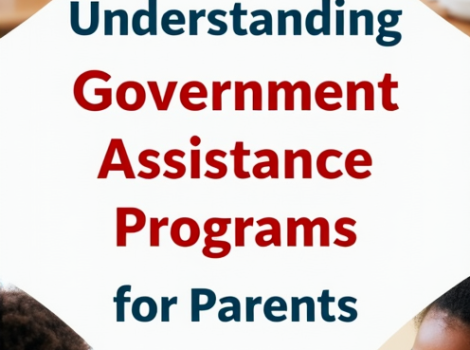The Parenting Resource That’s a Total Game-Changer!
If you’re searching for a game-changing parenting resource, look no further than digital tools and supportive communities. They can significantly boost your confidence and connection with your child. Apps that track milestones or podcasts offering practical advice can make parenting feel more manageable. Consider joining local groups or online forums for shared experiences and encouragement. And remember, effective parenting often hinges on open communication and celebrating small victories. These resources empower you to adapt your strategies while building a support network. Keep exploring, and you’ll unlock even more insights that can transform your parenting journey!
Key Takeaways
- Digital apps track milestones and manage schedules, offering parents a streamlined approach to monitor development and routines effectively.
- Educational workshops provide expert insights and community support, enhancing parenting skills and building a valuable network.
- Parenting podcasts deliver practical advice for multitasking parents, making it easier to learn on the go.
- Online forums create safe spaces for sharing experiences, fostering community and support among parents facing similar challenges.
- Interactive websites offer creative activities that enhance child learning, making parenting both fun and educational.
Understanding the Parenting Challenge
Navigating the parenting challenge can feel overwhelming at times, as you juggle countless responsibilities while striving to raise happy, healthy children. Understanding various parenting styles is crucial; they significantly influence child development. You might lean toward authoritative, permissive, or even uninvolved styles, but recognizing how these approaches affect your child’s emotional and social growth can empower you to make informed decisions.
Take a moment to reflect on your parenting style. Are you fostering independence or inadvertently stifling it? Each approach has its merits and drawbacks, and being flexible can lead to better outcomes. For instance, an authoritative style often encourages open communication and resilience, which can nurture your child’s ability to handle challenges.
It’s essential to adapt your strategies as your child matures. Infants need more structure, while teenagers crave autonomy. By actively engaging with your child’s unique needs at each developmental stage, you can create an environment that promotes their overall well-being. Remember, there’s no one-size-fits-all solution; stay attuned to your child’s cues, and don’t hesitate to adjust your approach as necessary. Embrace this journey, and remember that mastery comes with practice and patience.
Innovative Resources to Explore
There are countless innovative resources available today that can enhance your parenting journey and support your child’s development. Embracing mindful parenting is easier with various digital resources at your fingertips. Parenting apps can guide you in tracking milestones, managing schedules, and even offering tips for daily challenges.
Consider engaging in educational workshops that provide valuable insights from experts. These workshops often foster community initiatives where you can connect with other parents facing similar challenges. Don’t overlook the power of parenting podcasts; they offer practical advice and inspiration while you multitask.
Online forums serve as safe spaces for sharing experiences and gaining wisdom from other parents. You can also explore interactive websites packed with creative activities that stimulate your child’s learning and development. Virtual support groups can provide the encouragement you need, allowing you to share your journey with others who understand.
Strategies for Effective Parenting
While parenting can sometimes feel overwhelming, implementing effective strategies can make a significant difference in both your experience and your child’s development. Start by embracing positive discipline. This approach focuses on teaching rather than punishing. Set clear expectations and consequences, and consistently follow through. It encourages your child to understand the reasons behind their actions and decisions, fostering a sense of responsibility.
Incorporate mindful parenting into your daily routine. This means being present and engaged during interactions with your child. When you practice mindfulness, you create a nurturing environment that allows for open communication. Listen actively, validate their feelings, and respond thoughtfully. This not only strengthens your bond but also promotes emotional intelligence in your child.
Additionally, establish routines that provide structure and predictability. Children thrive when they know what to expect. Regular family activities, like meal times or game nights, can reinforce connections and create lasting memories.
Lastly, take care of yourself. Remember, you can’t pour from an empty cup. By prioritizing your well-being, you’ll be better equipped to guide your child with love and intention. Implement these strategies, and watch your family flourish.
Building a Support Network
Building a support network is essential for any parent, as it provides the encouragement and resources you need to thrive in your parenting journey. By nurturing relationships with others who understand the challenges of parenting, you can create a solid foundation for both you and your family. Here are three effective ways to build that network:
-
Join Parenting Groups: Connecting with local or online parenting groups allows you to share experiences, seek advice, and find camaraderie among fellow parents.
-
Leverage Community Connections: Don’t underestimate the power of your community. Attend local events, workshops, or classes to meet other parents and form lasting relationships.
-
Reach Out for Help: Whether it’s asking a neighbor for babysitting help or chatting with a friend about challenges, reaching out can lead to invaluable support and understanding.
Creating a support network isn’t just about finding people to help; it’s about building a community that fosters growth, learning, and resilience. By actively engaging with others, you’ll not only enhance your parenting experience but also create lasting friendships that enrich your life.
Success Stories From Families
Success stories from families can inspire you as you navigate your own parenting journey. Hearing about transformative experiences and real-life impacts helps you see the possibilities for growth and connection in your family. Let’s explore these uplifting tales that remind us of the strength and resilience found in everyday parenting.
Transformative Parenting Experiences
Many families have experienced transformative moments that reshaped their parenting journey, revealing the power of connection and understanding. These instances often stem from adopting new parenting mindsets and utilizing transformative techniques that enhance relationships.
Here are three impactful experiences shared by families:
-
Mindful Communication: One family discovered that taking a few moments each day for open discussions fostered deeper connections. This technique helped them navigate conflicts with empathy.
-
Embracing Vulnerability: Another family learned that sharing their own fears and challenges with their children created a safe space for honest conversations. This vulnerability strengthened their bond and taught resilience.
-
Celebrating Small Wins: A third family made it a practice to celebrate even the smallest achievements. This shift in mindset encouraged positivity and motivated everyone to strive for personal growth.
Real-Life Impact Stories
Sharing real-life impact stories can be a powerful way to inspire change in your own parenting journey. When you hear real-life testimonials from families who’ve faced similar challenges, it can spark new ideas and strategies that resonate with you. For instance, one family struggled with their child’s anxiety during school transitions. By incorporating techniques from a parenting resource, they established a routine that provided structure and comfort. Over time, their child flourished, showcasing remarkable resilience and confidence.
These impactful anecdotes serve as a reminder that you’re not alone in your struggles. Another family shared how they transformed their mealtime chaos into a harmonious experience by implementing simple communication techniques. As a result, mealtimes became a cherished family bonding time, rather than a source of stress.
Tips for Implementation
When you’re ready to put new strategies into action, remember to start small and simple. Setting realistic expectations will help you stay motivated and engaged with your family. Plus, encouraging open communication creates a supportive atmosphere where everyone feels heard and valued.
Start Small and Simple
Start small and simple to make parenting changes feel manageable and less overwhelming. Instead of trying to overhaul your entire routine, focus on small wins that can lead to significant improvements over time. Simple steps can help you build confidence and create lasting habits.
Here are three practical ways to get started:
-
Choose One New Habit: Select a single behavior you want to change—like reading a bedtime story every night. This small win can become a cherished routine without feeling burdensome.
-
Set a Timer for 5 Minutes: Dedicate just five minutes each day to engage with your child. Whether it’s playing a game or asking about their day, this small investment can strengthen your bond.
-
Reflect Weekly: Take a moment each week to evaluate what’s working and what’s not. This reflection allows you to adjust your approach, ensuring your efforts remain achievable and motivating.
Set Realistic Expectations
Setting realistic expectations is crucial for creating a positive parenting experience. You’ll find that aligning your parenting milestones with what’s achievable can significantly reduce stress and frustration. Start by assessing your child’s age and developmental stage; this helps you set realistic goals that reflect their capabilities and needs.
Break down these goals into smaller, manageable steps. Instead of expecting your toddler to master potty training overnight, acknowledge that it’s a process that takes time and patience. Celebrate small victories along the way to keep motivation high for both you and your child.
It’s also essential to remember that every child is unique. What might be a reasonable expectation for one child could be unrealistic for another. Stay flexible, and be prepared to adjust your goals as needed. This adaptability not only fosters a supportive environment but also teaches your child resilience.
Lastly, don’t hesitate to seek guidance from other parents or resources. Sharing experiences can provide valuable insights and help you refine your approach. By setting realistic expectations, you pave the way for a more fulfilling and enjoyable parenting journey.
Encourage Open Communication
Open communication is vital for nurturing a strong parent-child relationship. It fosters trust and understanding, allowing your child to express themselves freely. Here are three practical tips to encourage open communication:
-
Practice Active Listening: When your child talks, give them your full attention. Make eye contact, nod, and respond appropriately. This shows them that their thoughts and feelings matter.
-
Emotional Validation: Acknowledge your child’s emotions, even when you don’t fully understand them. Phrases like, “I can see you’re upset,” or “It’s okay to feel that way,” help them feel heard and respected. This validation builds their confidence in sharing.
-
Create a Safe Space: Designate a time or place where your child feels comfortable talking. Whether it’s during a walk or at bedtime, having a consistent environment encourages them to open up without fear of judgment.
Frequently Asked Questions
How Do I Know if This Resource Is Right for My Family?
To determine if this resource fits your family, assess your family dynamics and parenting styles. Reflect on what you value most and how it aligns with this resource’s principles, ensuring it supports your unique needs effectively.
Are There Any Costs Associated With Using This Parenting Resource?
Navigating costs can feel like sailing in fog. You’ll encounter subscription fees for access, but these often include valuable additional materials. Weigh the investment against the support and insights you’ll gain for your family’s journey.
Can This Resource Be Used for Children With Special Needs?
Absolutely, you can use this resource for children with special needs. It offers inclusive strategies and tailored approaches, helping you create an environment where every child thrives. You’ll find practical support that meets diverse needs effectively.
Is There a Recommended Age Range for This Parenting Resource?
While age recommendations can vary, it’s essential to align the resource with your child’s developmental milestones. Focus on their unique needs and strengths to effectively support their growth, regardless of the specific age range suggested.
How Can I Provide Feedback on My Experience With the Resource?
To provide feedback on your experience, consider using various feedback methods like surveys or online forums. Sharing experiences helps others grow, and your insights can significantly influence improvements and foster a supportive community.



